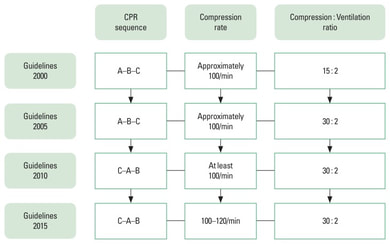|
The pace of compressions during CPR is 100-120 compressions per minute (cpm). The song most traditionally associated with CPR is the 1977 song "Stayin' Alive" by the Bee Gees, which has a tempo of 103ish beats per minute (bpm). That tempo (coupled with the obvious relevance of the title towards saving someone's life) makes it easy to remember and teach!
It's certainly very good to use, but it might not be the BEST song for a few reasons:
Below we've got our list of proposed "new" songs to do CPR to, and you will not believe the best choice to replace "Stayin' Alive" in terms of tempo, topic (relevant to CPR), and popularity!
0 Comments
 CPR guidelines recommend 30 chest compressions followed by 2 breaths as one cycle. The reason for this specific number is based on a lot of factors, including physiological considerations and research conducted on CPR guidelines throughout the last 75 years. The recommendation for 30 compressions in each cycle has evolved over time based on research and feedback from medical professionals (which is still ongoing). For example, the American Heart Association first recommended 15 compressions followed by 2 breaths in 1966, and later in the 1970s changed it to 5 compressions followed by 1 breath for 2 rescuers. The current recommendation of 30 compressions followed by 2 breaths was adopted in 2005 and has remained the standard since then, although the rate of compressions has changed to its current 100-120 cpm (compressions per minute). Compressions squeeze the heart and pump oxygenated blood throughout the body's organs and (crucially) the brain. Proper compression depth and rate is important to adequately squeeze the heart so that blood actually pumps around the body. But why group them into sets of 30?  Hint: This is a terrible first aid kit... Hint: This is a terrible first aid kit... Loads of first aid kits you find in stores are ridiculous, most of them include assorted sizes of bandages, like those little tiny spot Band-Aids that are no help in an emergency and are the only ones left over when you inevitably use up all the useful sizes. The first question you need to answer is, "What is the purpose of this first aid kit?" At the very least, you should be prepared for serious emergencies like severe bleeding, heart attacks, and broken bones. If you only have 5 things in your first aid kit, ideally the supplies you include should be helpful for multiple types of emergencies, unlike those ridiculously specific Band-Aids. Side note: the best kind of Band-Aids (if you were going to include a 6th item) are the Flexible Fabric kind! Remember, don't worry about getting lots of different sizes. |
AuthorsOur coaches are working hard gaining experience and putting together resources to help YOU!
NOTE: All of our College Success tips work for ANY level of school!
Archives
July 2024
Categories
All
|

 RSS Feed
RSS Feed